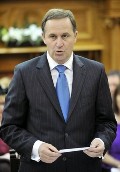New Zealand protests big new British air departure tax
 Wellington - New Zealand has protested to Britain about a proposed huge increase in the departure tax charged air passengers, fearing it will hurt the tourist industry, already suffering from a slump in visitor numbers because of the international financial crisis, news reports said on Wednesday.
Wellington - New Zealand has protested to Britain about a proposed huge increase in the departure tax charged air passengers, fearing it will hurt the tourist industry, already suffering from a slump in visitor numbers because of the international financial crisis, news reports said on Wednesday.
Prime Minister John Key said he told his British counterpart Gordon Brown the increased tax on long distance passengers was a "significant concern" to New Zealand when the two men had talks in London on Tuesday.
Britain is New Zealand's second biggest source of tourists, sending nearly 290,000 visitors in the last year, and Key said the new charges - supposedly designed to offset the environmental impact of long distance flights - would be "a significant impost" on travellers.
"Given that tourism is our largest export earner, I am quite concerned about the proposal," Key, who appointed himself minister of tourism when forming his new government last week, told reporters.
He said he was also concerned about a "contagion effect" that would cause other countries, especially in Europe, to follow Britain and adopt a similar tax.
Key told Radio New Zealand the tax was unfair because it did not recognize that different airlines and aircraft had varying environmental impacts.
The state-owned Air New Zealand is pioneering trials with biofuel to reduce the airline's carbon footprint.
The British departure tax increases the further a passenger flies to help offset aircraft carbon emissions. Travel to New Zealand attracts the highest of four tax levels because of its distance from Britain, rising to 85 pounds (131 dollars) in November 2010.
New Zealand tourism industry leaders dismissed the tax rises as having more to do with increasing government revenue than helping the environment.
Bruce Robertson, chief executive of the Hospitality Association, told the New Zealand Herald, "This is a trade barrier to make it more difficult for Britons to travel long distance and, effectively, will be encouraging them to stay at home." (dpa)